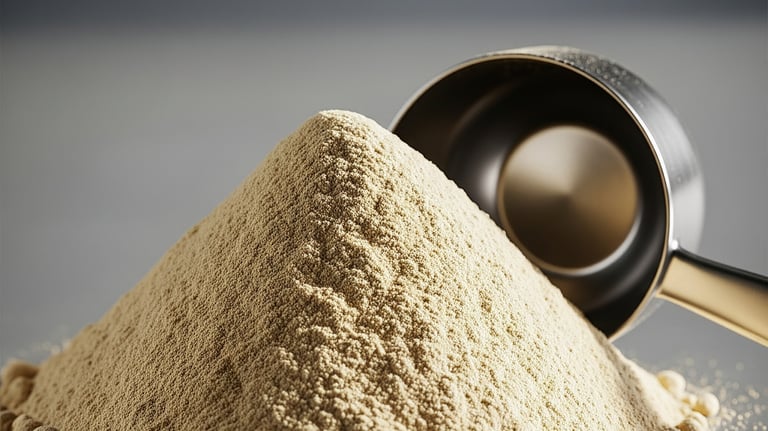Pea Protein-Based Fat Replacement: Kerry Group’s Latest Innovation
ALTERNATIVE PROTEINSFROZEN FOODSUSTAINABILITY


This is an AI generated illustration and does not represent actual product or service.
Rethinking Animal Fat in Plant-Based Foods
As plant-based meat alternatives gain momentum globally, one challenge continues to stand out—replicating the texture, richness, and mouthfeel of animal fat. Traditional substitutes like coconut oil offer a partial solution but come with nutritional, environmental, and processing drawbacks.
Now, an innovation from Kerry Group, detailed in patent WO2024018028A1, introduces a novel solid oil-in-water emulsion designed to closely mimic animal fat—without the saturated fat or sustainability concerns.
Why Current Fat Replacements Fall Short
Animal fat plays a crucial role in the flavor, texture, and appearance of meat. Coconut oil, commonly used in plant-based meat, is solid at cold temperatures and melts pleasantly during cooking—but it has major downsides. It contains an extremely high level of saturated fat (up to 90%), raising health concerns among consumers. Additionally, coconut farming is linked to deforestation and monoculture-related environmental issues. Price volatility and supply chain risks further complicate its use, as production depends heavily on tropical climates.
From a processing perspective, coconut oil needs pre-treatment such as grinding or tempering before it can be effectively incorporated into food manufacturing. While other fat alternatives combine plant oils with textured vegetable proteins (TVP), these often fail to deliver the structural integrity and juicy mouthfeel of real animal fat. They also require additional additives—like salts or enzymes—which go against clean-label expectations.
Kerry’s Solution: Structurally Stable, Nutritionally Smart
Kerry’s innovation is a solid oil-in-water emulsion made entirely from plant-based ingredients. It contains 7–22% plant protein (such as pea or fava bean protein), 7–45% plant oil (like rapeseed or canola), and 45–80% water to create a stable and consistent emulsion.
🔬 What Makes It Unique?
1. Balanced Protein-to-Oil Ratio:
A finely tuned protein-to-oil ratio between 1:1.9 and 1:2.3 was found to be crucial in achieving the right texture. For example, a formulation using 12.3% pea protein and 23.6% rapeseed oil (a 1:2.23 ratio) delivered optimal mouthfeel and firmness.
2. High-Pressure Homogenization:
The emulsion’s texture improves significantly with higher homogenization pressure. Without homogenization, the resulting gel had a low firmness of just 0.37 newtons (N). However, applying 100 bar of pressure increased firmness to 1.15 N. Further increases to 200, 300, and 400 bar resulted in firmness values of 1.48, 1.62, and 2.45 N respectively. This firmness not only mimics animal fat but also ensures the emulsion holds its shape during processing and cooking.
3. Thermal Stability:
Another major advantage is heat resistance. Coconut oil begins melting at about 23°C, which can cause issues during cooking. In contrast, Kerry’s emulsion remains stable at cooking temperatures ranging from 40°C to 80°C, making it ideal for plant-based meats that are grilled, fried, or baked.
4. No Need for Additives:
Unlike other solutions that rely on added salts, enzymes, or dough conditioners to maintain structure, Kerry’s formulation gels naturally—supporting clean-label claims and reducing ingredient complexity.
Performance in Real-World Applications
When used in vegan burgers at a 5% fat content, the Kerry emulsion showed clear nutritional advantages over traditional coconut oil. The emulsion-based burger had a total fat content of just 4.7 grams per 100 grams—less than half that of a coconut oil-based burger, which had 9.9 grams. Saturated fat dropped by an even larger margin, from 5.81 grams in the coconut oil version to only 0.51 grams in the emulsion-based one—a 91% reduction. This also brought down the total calorie count, lowering it from 192 to 148 kilocalories per 100 grams, which is a 23% drop.
In blind taste tests with over 50 participants, the emulsion-based burgers performed exceptionally well. Participants preferred them over coconut oil versions in succulence, texture, and flavor. The emulsion burger scored 25 out of 35 points for juiciness, compared to 22 for the coconut oil version. For texture, it scored 28 points versus 26, and for flavor, it earned 25 points versus 20—demonstrating a clear preference across key sensory attributes.
Why This Innovation Matters
Clean Label, Clean Conscience:
The formulation avoids hydrogenated oils, chemical additives, and animal-derived components—making it both vegan-friendly and label-friendly.
Sustainable Ingredients:
By using oils like rapeseed or canola instead of tropical oils, this solution significantly lowers environmental impact.
Manufacturing-Friendly:
The emulsion can be hot-filled directly into molds without the need for grinding or pre-treatment, simplifying the production process for manufacturers.
Highly Versatile:
Beyond burgers, the emulsion is suitable for a wide range of products, including sausages, bacon analogs, and hybrid meat-plant items.
Conclusion: A Leap Forward in Plant-Based Fat Innovation
Kerry Group’s solid oil-in-water emulsion offers a compelling alternative to traditional fat replacements in plant-based meat. With its optimized protein-oil ratio, heat stability, clean-label composition, and outstanding sensory performance, it solves many of the key challenges the industry has faced.
Not only does it reduce fat and calories significantly, but it also enhances the eating experience—helping plant-based products better compete with animal-based ones on taste and texture. Looking ahead, scaling this solution and exploring new protein-oil combinations could open even more possibilities for sustainable and health-conscious food innovation.




